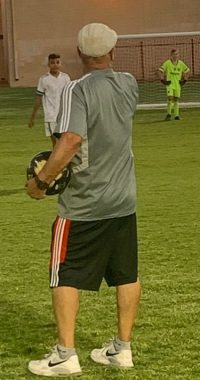Philosophy

Establish an offensive style of play seeking to be protagonists through the possession of the ball .
Be ambitious and aggressive, support the ball holder, be deep and attack the rival with decision.
Quick react to loss, take defensive risks, put pressure on the opponents and don’t let them think.
Order to coordinate efforts and shape aggressiveness and intensity (offensive and defensive) but never to the detriment of these.
Maintain concentration to execute set ball situations (offensive and defensive) understanding they can be decisive in the development and result of the game.
COMMANDMENTS
- Always keep the objectives in mind and commit to their development.
- Place human beings and their development as the central axis of the project.
- Pursue learning and development of all. Improve those around us to be better ourselves.
- Respect learning processes by understanding mistakes as a part development and constantly seeking improvement.
- Have the pursuit of excellence an attitude.
- Seek unity and foster trusting relationship. This starts with head coach, his staff, players, coaches of youth teams , employees, etc.
Remember: Neither performance nor results define people.

MAIN OBJECTIVES
Defensive phase
- Organization
- Aggressiveness
- 1 v 1 Defensive
- Reaction
Transitions
- From Attack to Defense
- From Defense to Attack
Offensive phase
- Beginning
- Gestation
- 1 - 1 Offensive
- Finishing
Restarts
- Goals Kicks
- Free Kicks
- Corners
- Others
Attitude
- Leadership
- Commitment
- Resilience
- Confidence
WORK PRIORITIES
Conceptual priorities
- Profiles
- Angles
- Support
- Finishing
Defensive priorities
- Agresivity to recover
- Quick reaction to loss
- Defensive organization
Offensive priorities
- Attaking moves
- Play iniciation
- Unmark moves
Match Preparation
- Post Game Analysis
- Team Selection
- Tactics and Strategy
- Weekly Planning
- Game